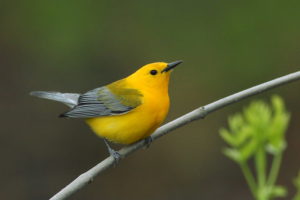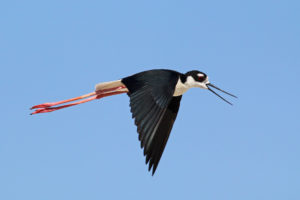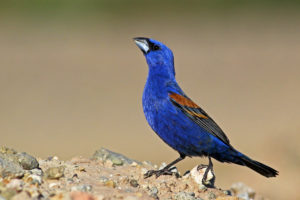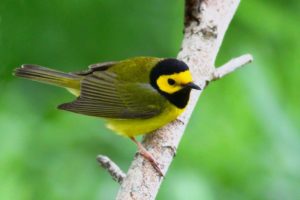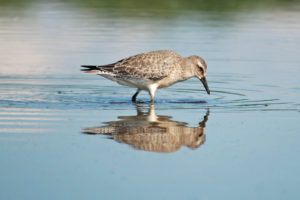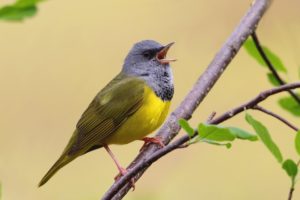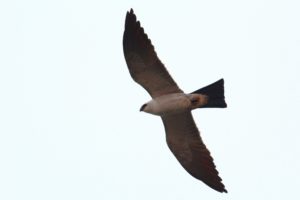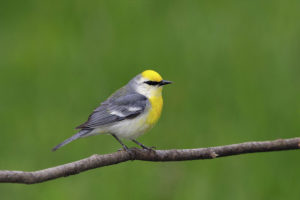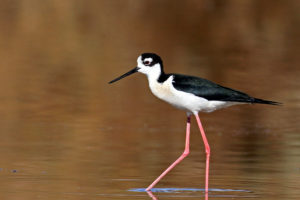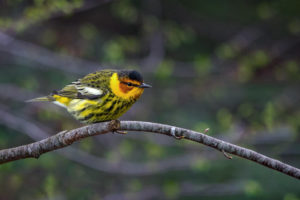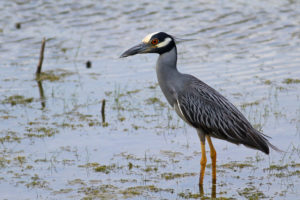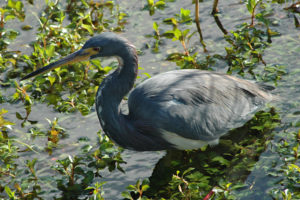Cape May Spring Birding - Northeast Birdwatchers' Paradise

May 7 - 11 2025
$1,775 | ($500 deposit due upon registration)
$450 single supplement
Includes all lodging, transportation, and food
7 participants max
Guide: Chip Darmstadt
B
irding in Cape May and southern New Jersey during spring migration is legendary! Of the close to 500 species on the New Jersey bird list, over half of those can be seen in New Jersey on a single day in May! However, we’ll take our time exploring southern New Jersey and its abundance of bird life: migratory warblers in the shrubs and forests, birds of prey cruising overhead, and shorebirds along the beaches and backwaters. Wading birds and rails stalk the saltmarshes and nightjars sing through the night. Though less than a day’s drive from NBNC, Cape May is a whole new and exciting world of birds rarely if ever encountered in Vermont! Summer Tanager, Prothonotary Warbler, Red Knot and Yellow-breasted Chat are just the tip of the iceberg. And there’s always the possibility of a few rarities showing up in Cape May. Past trips have enjoyed Swainson’s Warbler, Swallow-tailed Kite, Curlew Sandpiper and Black-necked Stilt among other southern wanderers.
Itinerary and Focal Species
May 7
Today we have a long drive down to Cape May (roughly 8 hours without stops). Depending on the weather and timing, we may stop at a fantastic heron rookery outside of Ocean City or just head to our hotel and have some time for a pleasant bird walk along the beach. We'll keep an eye out for Piping Plovers, Black Skimmers and Royal Terns in walking distance of the hotel rooms! Overnight Cape May at the Sea Crest Inn
May 8
We’ll spend the morning on Cape May Island (the portion of Cape May south of the Cape May canal), exploring Higbee Beach and other local hotspots. Blue Grosbeak, White-eyed Vireo, Yellow-breasted Chat, Prothonotary Warbler and Yellow-billed Cuckoo are among the less common migrants and resident species we may bump into. More easily seen are Prairie, Chestnut-sided, Northern Parula and Black-and-White Warblers. In any case we could see over a dozen warbler species this morning, depending on the conditions.
After lunch in the field, and as things warm up, we’ll head over to the Beanery or Cape May Point State Point to watch for migrating raptors. Cape May is renowned as a migration hotspot in general and we’ll turn our attention skyward in search of raptors like Mississippi Kite, Peregrine Falcon, and Bald Eagle.
May 9
This morning we’ll head up to Brigantine (Edwin B. Forsythe NWR), and then work our way south. Brigantine, Stone Harbor Point, Nummy Island and the Wetlands Institute all offer wonderful opportunities to study shorebirds and wading birds like Tricolored Heron and Yellow-crowned Night-Heron at close range. Red Knot, Black-bellied Plover, White-rumped Sandpipers and American Oystercatchers are just a few of the possibilities!
After dinner in Cape May, we’ll head to Jake’s Landing for a shot at hearing Black Rail. This elusive and declining species has breed this location, but has become a formidable challenge to hear, much less to see. We’ll have an easier time locating Clapper Rails, Seaside Sparrow, Eastern Whip-poor-Will and Chuck-Will’s-Widow.
May 10
Dawn will find us at Sunset Bridge, a quiet and very birdy road in Belleplain State Forest. We’ll look and listen for a wonderful diversity of birds that nest here - Hooded, Prothonotary and Kentucky Warblers, Acadian Flycatcher, Summer Tanager, Yellow-billed Cuckoo, Louisiana Waterthrush and so much more. Once the songbirds quiet down, we’ll head over to Heislerville Wildlife Management Area where thousands of shorebirds feed and roost. A Peregrine Falcon looking for lunch may send Dunlin, Semipalmated Plover, Short-billed Dowitchers and Black Skimmers into flight, wheeling above the mudflats as we watch on in amazement!
May 11
We'll head home after a little morning birding, arriving back in Vermont in time for supper. If time allows, we’ll stop at Sandy Hook or another birding locale on route home.
Additional Information (Click each tab to expand)
We’ll leave the hotel to begin our search each morning at sunrise to encounter songbirds when they are at their most active. We’ll travel from place to place throughout the day, with plenty of stops for refreshments and restrooms along the way, and return to our lodging with time to freshen up before dinner in town. While we don’t include mid-day siestas on this action-packed trip, we will be within 15 minutes of our lodging most of the time, so we can easily swing by the hotel for those needing a couple hours of downtime.
While we will spend the entire day birdwatching each day, we will not be “rushing” from place to place. Our goal is to enjoy spending time with these amazing animals. We are searching for rich experiences and astonishing biodiversity, and not necessarily the longest species list.
We’ll be staying at the Seacrest Inn right in Cape May. We selected our lodging to ensure clean and comfortable accommodations situated right in the heart of the birding hotspots we’ll be visiting – right on the shore, and less than a block from the edge of the Cape May Wetlands State Natural Area.
We will typically have picnic breakfasts (including coffee) and lunches in the field each day, and we provide a range of options to accommodate preferences and dietary restrictions. Our dinners will typically be at restaurants in the town of Cape May.
Chip Darmstadt is the Birding Ambassador and "emeritus" executive director of North Branch Nature Center and an avid birder and naturalist. Chip has led birding trips in the US and across the world with NBNC for the last two decades, observing over 2,000 bird species along the way. Cape May has become an annual pilgrimage for Chip, who has brought NBNC youth and adult teams to participate in the World Series of Birding event that takes place each spring in Cape May. When not leading birding trips around the world, Chip works on extending his streak of over 2,000 consecutive days of eBird checklists!
Included:
- All lodging.
- All meals.
- All transportation (including from NBNC to Cape May) in a comfortable van.
- Expert bird guide.
- Park entrance fees.
- Pre-departure group briefing before the trip.
- Use of high quality spotting scopes and binoculars.
- Use of field guides.
Not included:
- Incidentals and snacks.
- Gratuities.
NBNC is proud to announce that all of our trips from 2025 onward are 100% carbon-neutral. This includes each traveler's flights to and from this destination, as well as carbon emitted during the trip.
How it Works: The voluntary carbon market has come under intense scrutiny in recent years as the legitimacy and effectiveness of many carbon offsetting projects have been called into question. That's why we're proud to be working directly with the Northeast Wilderness Trust's Wild Carbon program. The carbon credits we purchase to offset our carbon emissions are used to permanently conserve forestland as wilderness. Why wilderness offsets?
- It's Permanent: Unlike most contracts in the voluntary carbon market that have a lifespan of just 10-20 years, wilderness conservation is forever.
- It's Additive: Acreage purchased and conserved through wild carbon offsets would not be protected anyway through another mechanism later.
- It's "Leakproof:" Forest protection often just shifts and concentrates timber harvest elsewhere. But wilderness conservation is different–wilderness protection here doesn't just move carbon emission over there. That's because old forests function very differently than young ones. Big trees and old soils capture and store vastly more carbon than a young forest of the same acreage. Growing an old forest is like building a natural carbon sequestration factory!
- It's More than Carbon: With wilderness protection comes additional co-benefits like biodiversity conservation, flood resilience, and habitat connectivity. This way, going carbon-neutral isn't just negating our carbon footprint, it's also actively helping conservation in other ways.
Want to learn more?:
- Read The Ecotourism Dilemma our article on how we think about carbon emissions in the context of nature travel.
- Check out this FAQ for NBNC travelers about Northeast Wilderness Trust's Wild Carbon Program.
- To learn more about forest carbon storage, please watch Understanding Forest Carbon by climate forester Dr. Ali Kosiba.
Here’s an eBird Checklist of species seen in May in the Cape May area over the last five years.
- Please see our COVID-19 page for NBNC's full policies surrounding COVID and other illnesses.
- All participants and instructors will be required to affirm negative test results from a self-administered Covid-19 rapid antigen test taken prior to arrival on the first day of the program.
- Participants on NBNC’s Adventures Afar and multi-night overnight trips must be comfortable with the possibility that someone on the trip may contract Covid-19 (or other contagious illnesses) during the trip, even if they test negative on the first day as required. NBNC will attempt to limit exposure and isolate any such participant, which could include that participant incurring additional expenses such as hotel rooms, meals, or transportation, and missing out on group activities. However, isolation may not be possible at all times on all trips, so all participants should be aware that circumstances may require that a participant with Covid-19 continue to travel with the group.
- Participants experiencing respiratory symptoms will be required to wear a mask at all times when around other travelers.
- Failure to comply with the health and safety instructions of the trip guides will result in dismissal from the trip.
- NBNC encourages all Adventures Afar participants to be honest and transparent about their symptoms, for the sake of their health and the health of those they are traveling with.
- NBNC encourages all Adventures Afar participants to secure individual travel insurance.
Ready to go to Cape May?
Email [email protected] to get signed up.
Payment Schedule
- A $500 deposit is required to reserve your space on the trip.
- 50% of the trip balance will be due 6 months before the departure date.
- The remaining trip balance will be due 3 months before the departure date.
All payments can be made via ACH withdrawal, or by check. Credit card payments will incur a 3% surcharge.
Cancellation Policies
We understand that incidents and emergencies arise that may force you to cancel your trip. However, NBNC invests considerable time and, in many cases, non-refundable payments to lodges and local contractors to secure our rooms and programming. NBNC aims to be as flexible as possible in our refund policy, but a full refund of your payments may not be possible after the dates indicated. All cancellations must be made via email to NBNC.
-
Cancellation more than 180 days before the trip: Full refund of all payments.
-
Cancellation 90-180 days before the trip: Refund of any payments minus the $500 deposit. If your space is filled by another traveler, we will also refund your deposit.
-
Cancellation 30-90 days before the trip: No refund guaranteed. If your space is filled by another traveler, we will provide a full refund minus the $500 deposit.
-
Cancellation less than 30 days before the trip: No refunds guaranteed.
We highly recommend purchasing private travel insurance to cover expenses that are outside of NBNC's cancellation and refund policies.
All photos by Tyler Pockette

713 Elm Street
Montpelier, Vermont 05602
(802) 229-6206
Hours: Center Open Monday-Friday 9-4
Trails Open 24/7

